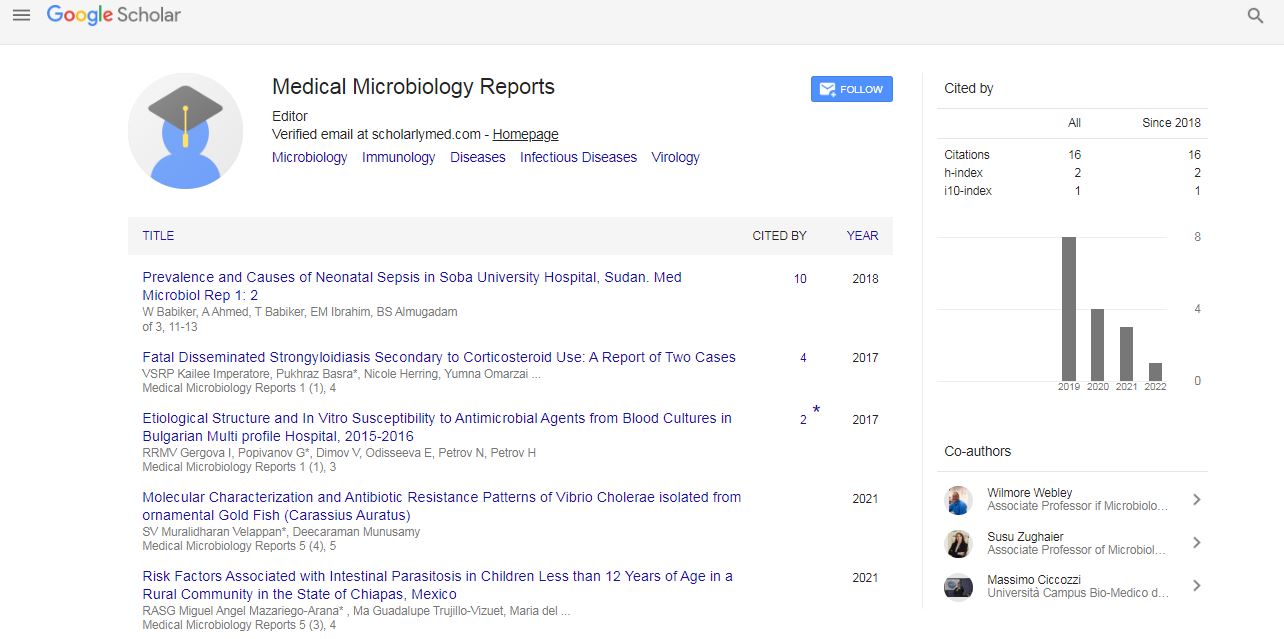Short Communication, Med Microbiol Rep Vol: 5 Issue: 1
Natural killer cell based immunotherapies as cancer therapeutics
Kawaljit Kaur
UCLA School of Dentistry, USA
Abstract
Natural killer (NK) cells are known to target cancer cells. Since conventional cancer therapeutics including chemotherapy and radiotherapy remain unsuccessful to completely cure the cancer, there has been increasing demand of immunotherapies to treat cancer. In past few years there has been NK cell-based immunotherapies showed promising results. But, decreased NK cell cytotoxicity has been documented in cancer patients both in peripheral blood and tumour microenvironment. Advances in understanding of anti-tumour immune responses and cancer biology have revealed a complex dynamic interaction between the immune effectors and the tumour cells. Therefore, because of defects in cancer patients’ NK cells, utilizing healthy allogeneic NK cells should be selected as cancer immunotherapeutic.
Keywords: Bacteriology, Virology, Immunotherapies, Microbiology
Abstract:
Natural killer (NK) cells are known to target cancer cells. Since conventional cancer therapeutics including chemotherapy and radiotherapy remain unsuccessful to completely cure the cancer, there has been increasing demand of immunotherapies to treat cancer. In past few years there has been NK cell-based immunotherapies showed promising results. But, decreased NK cell cytotoxicity has been documented in cancer patients both in peripheral blood and tumour microenvironment. Advances in understanding of anti-tumour immune responses and cancer biology have revealed a complex dynamic interaction between the immune effectors and the tumour cells. Therefore, because of defects in cancer patients’ NK cells, utilizing healthy allogeneic NK cells should be selected as cancer immunotherapeutic.
Natural Killer cells:
NK cells originate from the bone marrow and are known to mediate direct natural cytotoxicity as well as antibody-dependent cellular cytotoxicity (ADCC). By producing key cytokines and chemokines NK cells are known to regulate the functions of other immune cells. Conventional human NK cells are identified by the expression of CD16 and CD56, and by the lack of surface CD3 expression. NK cells mediate their function through a number of important activating and inhibitory cell receptors. It is thought that the balance between activating and inhibitory signals which NK cells receive from their surface receptors determines their functional fate.
Effectors of the immune system are thought to shape the survival and maturation of tumour cells and to select for cancers with reduced immunogenicity. Although, immunosuppression and tumour escape from immune recognition are thought to be major factors responsible for the establishment and progression of cancer, neither their underlying physiological significance nor the exact mechanisms by which immunosuppression occurs are completely understood.
Natural Killer cells in cancer patients:
Several studies attributed significant cancer related detrimental effects on the immune cells function especially NK cells, however, the underlying mechanisms have not been elucidated. A major decrease in NK cell killing activity has been observed by exposure to NK sensitive target cells-K562 and it was associated with the down regulation of CD16 surface receptors. Loss of CD16 was associated with increased production of IFN-γ and up-regulation of CD107a a marker of degranulation. Significant down regulation in CD16 receptor expression and loss of NK cell cytotoxic function were seen in oral and ovarian cancer patients and also when NK cells were co-cultured with ovarian tumours.
Although it is known that NK cells are functionally inactivated in many cancer patients, it has yet to be shown whether inactivation of NK cell function is the consequence of establishment of cancer or precedes the establishment of cancer, during the pre neoplastic stage, in which case their functional loss may be responsible for the establishment of cancer. It has been demonstrated that the loss of NK cell function occurs at the pre
neoplastic stage and is correlated with the increased levels and the intensity of pre neoplastic lesions, increased inflammation, fibrosis, pancreatitis score and loss of normal ducts. In addition, it was shown that both environmental and genetic factors contribute to the loss of NK cell function, since their synergistic effect is responsible for the greater loss of NK cell cytotoxic function and augmented inflammatory cytokines and chemokines.
Furthermore, receptors and ligands required for NK cells function and expansion were found to be down-modulated in cancer patients and in pre-neoplastic stage, providing evidence that this is a complex mechanism and multiple factors are involved in either affecting the NK cell activity or tumor progression in cancer patients. Defect in NK cell function may result in the loss of tumor differentiation, increased survival of cancer stem cells, and progression from the pre-neoplastic to neoplastic stage, leading to invasion and metastasis of tumors. Decreased peripheral blood lymphocyte infiltration and lower cytotoxic activity, particularly in NK cells, result in poor prognosis in cancer patients. However, cancer-mediated immune suppression remains a complex and multifactorial problem. Various studies have shown that factors in the tumor microenvironment suppress NK cells by down regulating NK cell surface receptors.
Natural killer cell-based immunotherapies:
NK cell-based immunotherapies are among the leading standards in cancer therapeutics. However, NK immunotherapies have been limited due to the low numbers of NK cells in the peripheral blood and limited methodologies to expand large numbers of functional NK cells. To overcome the problem, several in vitro NK expansion techniques have been developed to allow for a higher therapeutic cell dose. The stimulation of peripheral blood mononuclear cells (PBMCs) or a purified population of NK cells with feeder cells such as K562 cells expressing interleukin (IL)-15 and 41BB ligand, EBV-TM-LCL, Wilm’s tumor or irradiated PBMCs have resulted in greater numbers of NK cells with adequate function.
The generated NK cells expressed higher levels of NKG2D, natural cytotoxicity receptors, DNAM-1, and ICAM-1. Thus, various methods to obtain ex vivo-expanded, activated, and CD3+ T cell-depleted NK cells have been established for clinical use.
In addition, Miller and colleagues established the safety and efficacy of adoptive cellular transfer of HLA-haploidentical NK cells in patients with advanced cancer. Additionally, clinical trials have shown that allogeneic NK cells play a therapeutic role in solid tumors, and are safe for transfer into patients. Studies have also introduced a novel NK expansion methodology using a combination of osteoclasts and sonicated probiotic bacteria to generate activated highly functional NK cells with the potential to kill cancer cells. The same study has found that NK cells from cancer patients are less capable to expand and become fully functional when compared to healthy individuals.
Conclusion:
Because of reduced function and lower potential to expand of cancer patients’ NK cells, use of autologous NK cell immunotherapy may not be the best approach to treat the patients. In order to cure cancer, deliveries of competent allogeneic NK cells to the patient need to be considered. Thus, combining allogenic NK cells with other immunotherapeutic strategies such as CAR-T, CAR-NK, anti-PD-1/and PD-L1 antibody targeting and chemotherapeutic and radio therapeutic need to be investigated.
 Spanish
Spanish  Chinese
Chinese  Russian
Russian  German
German  French
French  Japanese
Japanese  Portuguese
Portuguese  Hindi
Hindi 
